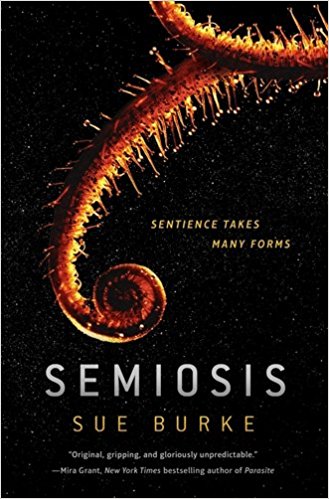Semiosis by Sue Burke
/Semiosis
by Sue Burke
Tor Books, February 2018
Semiosis might be a title you would rather associate with a scholarly tome about language than with a work of fiction but it does give a clear indication of what Sue Burke’s debut novel is about: communication. And because Burke’s book is science fiction, the story centers around the communication with sentient non-humans.
Encountering otherworldly beings for the first time is a classic theme in science fiction, and mostly, these stories are about miscommunication and the problems that arise from misunderstanding one another, like in Mary Doria Russell’s classic novel Sparrow or in the 2016-movie Arrival (based on Ted Chiang’s novella Story of Your Life).
Semiosis is no exception to that rule, but ‘the others’ in the novel are not human-like aliens but sentient plants. The setting of this first encounter-tale with a twist is a faraway - albeit earth-like – planet which “the earthlings” have named Pax. The book follows five generations of colonists over a time span of 107 years, from the arrival of the first group of fifty space travelers who have escaped their ravaged, war-torn home planet to create a better world, “a new society in full harmony with nature” up to their descendants over a century later.
At first, the colonists’ new home seems suitable enough for human life. It has gravity, a breathable atmosphere, no detectable predators, and a lush plant life that provides the arriving inhabitants with plenty of edible food.
Shortly after we landed, orange fruit like translucent persimmons had ripened quickly on the east vines and had recently appeared on the west vines. The fruit had been tested safe, contained plenty of vitamin C, and tasted like cantaloupe.
But the peaceful and welcoming surroundings turn out to be treacherous; the cantaloupe-like fruit that had been tasty and nutritious one day is poisonous the next. Soon enough, Octavio, the botanist of the first generation, comes to understand that this was not merely a fluke of nature but an act of war.
The war had begun long before we arrived because war was their way of life. It took its first victims among us before we understood what was happening, on an evening that that seemed quiet.
It doesn’t take long for the deeper truth of the planet’s original inhabitants to be revealed: Plants have not only evolved into sentient beings, they are the dominant life form on Pax, ready to go to war with any intruders. (And the human settlers appear not to have been the first ones…). Octavio and his fellow colonists, as well as the generations that follow, will have to come to terms with this truly alien intellect and try to find a way to co-exist with them.
Any multigenerational tale has its pitfalls. The main one being the difficulty to get the reader attached enough to each generation’s protagonists to stay engaged with the story but not too much so that the reader is willing to let go of them in the next chapter. Semiosis successfully holds the reader’s attention despite the generation jumps and the Tolstoian array of new characters the reader must get accustomed to in each chapter.
Yes, the book has its weaknesses. The parts told from the perspective of the sentient plants are sometimes bordering on cliché, especially the way their communication with each other is depicted. And at times, the reader is bombarded with too many details about the scientific aspects of non-Earth plant life and the toxicology of foreign plants.
Still, Semiosis ticks all the boxes the sci-fi-loving reader may expect from a first encounter-story, and it gives us a fresh and thought-provoking take on this classic theme.
Britta Böhler is a German-born author and former law professor. She has published literary fiction and a series of crime novels as well as various non fiction books about real life criminal cases. Her internationally acclaimed novel about Thomas Mann (English translation: The Decision) has been translated into eight languages. She lives in Amsterdam and Cologne and she writes in German, English and Dutch. For more information: www.brittaboehler.com
